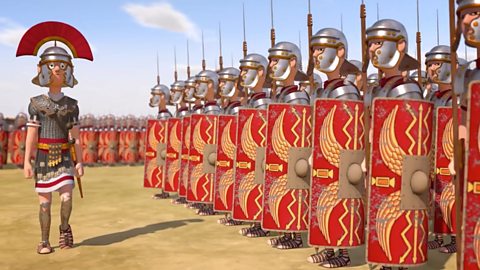When was the final Roman invasion of Scotland?
The Romans invaded Caledonia (Scotland) three times. The last time was in 209 AD under Emperor Severus. But why was it their last invasion?
Let's find out!
Find out about the last Roman invasion of Scotland.
ANITA: The Romans in Scotland, Emperor Severus and the third invasion.
Hello, my name’s Anita, my mum's a history professor and my dad’s an engineer, who knows all about building things. I’ve got a project for school about the Romans and I’ve got one question…
So after the Romans left Scotland did they ever come back?
MUM: Well, the Romans retreated to Hadrian's Wall, in the north of what is now England in 162 AD. Things were quiet for 20 years. And then…
According to the Roman historian Herodian, the tribes in the south of Scotland, the ‘Maeatae’, wrecked almost everything. Burning buildings, stealing cattle, ambushing soldiers. To end the rioting, the Romans paid the tribe silver coins to behave themselves.
ANITA: Can you pay ME money to behave?
MUM: Ah ha! Well the Romans must have got fed up with that, paying money to avoid fighting. Because the Roman Emperor himself, Septimius Severus, came to Britain in 209 AD.
Using two Roman forts as bases, Cramond and Carpow, Severus launched his invasion. To avoid destruction and total defeat, the local tribes made peace. After a year, Severus returned south to Eboracum, where York is today.
But peace didn’t last long. Once he was gone, the Maeatae and the Caledonians rebelled. Severus was too old and sick to return, so he sent his son, Caracalla, to regain control.
In 211 AD Severus died of old age and Caracalla agreed a truce with the tribes of Scotland. Rome retreated to Hadrian's Wall once again.
ANITA: Why?
DAD: Because it cost too much for Rome, in money and soldiers to control a threat right at the edge of their world. They had other issues to deal with in the Empire and Caledonia just wasn’t as important to them.
MUM: It didn’t sound like they thought much of the people here either, the Romans said some pretty weird things about the people north of Hadrian's Wall.
ROMAN: They plunge into swamps and exist there for many days with only their heads above water.
DAD: That’s why I married your mother. She is the most beautiful swamp monster I have ever met!
MUM: It’s not just the Romans that exaggerate.
Why did the Romans invade Scotland?
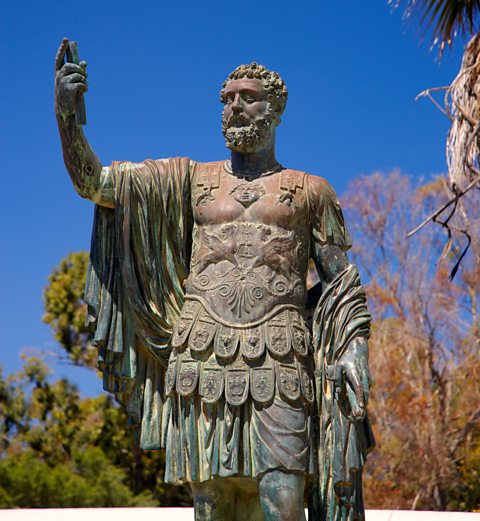
There were several reasons why the Romans tried another invasion.
Scotland had natural resources such as gold, iron, and coal that would be useful for the Roman Empire.
The Scottish tribes were also attacking Roman lands in England.
By 162 AD the Roman army had abandoned the forts along the Antonine Wall in the Central Belt of Scotland and retreated to the safety of Hadrian’s Wall in northern England.
By 209 AD attacks by Scottish tribes at Hadrian’s Wall were so bad that the Roman Emperor himself had to lead a Roman army back into Scotland to tackle the Scottish tribes.

What did Emperor Severus do?
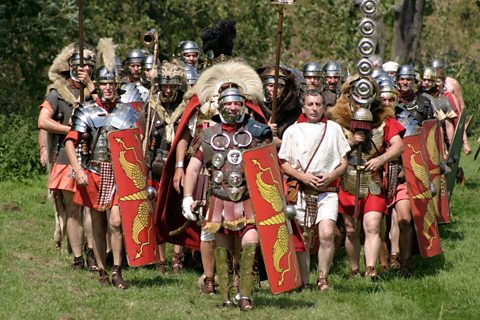
Emperor Severus arrived in Britain with an army of forty thousand men. First, he marched to Hadrian’s Wall and rebuilt sections of it to make it stronger.
Next, he marched north to the Antonine Wall and rebuilt some the abandoned forts.
First Severus and his army pushed north in the Highlands of Scotland. Later another Roman force under the leadership of his son, Caracalla, did the same.
They fought some of the tribes and also burned the crops of the tribes to deprive them of food. The aim of this was to weaken the tribes.
The plan worked and before long the Scottish tribes were seeking peace with the Romans.

Why did the invasion fail?
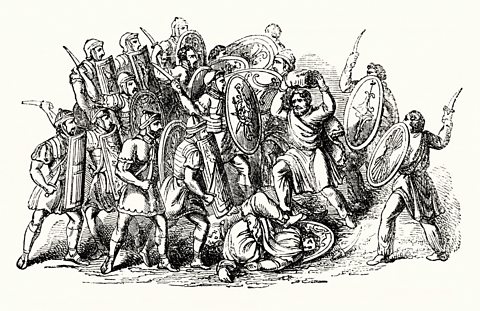
The Scottish tribes had learned the painful way that facing the Romans in big battles was a bad idea.
Instead they used different tactics called guerrilla warfare. This involved attacking the Roman army in lots of small battles when the Roman’s least expected it.
These tactics made life very difficult for the Romans but they wouldn’t be enough to get rid of the Romans in Scotland. For that, the Scottish tribes needed luck.
They got it in 210 AD when Emperor Severus suddenly died. His son, Caracalla, instantly abandoned the invasion of Scotland and returned to Rome to claim the role as the new emperor.
However, by the time Caracalla became emperor, the Roman Empire was having to fight off threats from European tribes closer to Rome. Caracalla decided that Rome did not have enough soldiers to risk another invasion of Scotland.
Scotland would never again have to fight off the Romans on Scottish soil.


Key words
- Antonine Wall - a defensive Roman wall that ran across Central Scotland from the Firth of Forth and the Firth of Clyde.
- Hadrian’s Wall - large defensive stone wall that ran across northern England. The wall marked the northern-most boundary of the Roman Empire.
- Emperor Severus - Septimus Severus was Roman emperor from 193 AD to his death in 210 AD. He planned and led the final invasion of Scotland (Caledonia).
- Emperor Caracalla - Caracalla was the son of Emperor Severus. After his father died in 210 AD, he became the new Emperor of the Roman Empire. He fought alongside his father in Scotland. It was his decision to remove Roman soldiers from Scotland.
More on Romans
Find out more by working through a topic
- count8 of 9

- count9 of 9
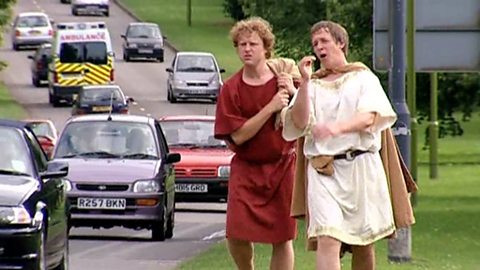
- count1 of 9
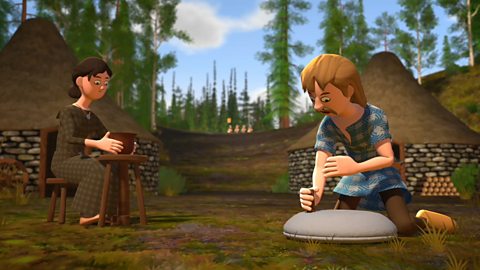
- count2 of 9
